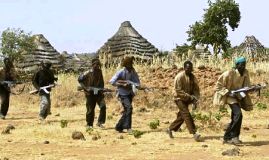Sudan says rebels kill 89 since ceasefire
KHARTOUM, Dec 5 (Reuters) – Sudan on Sunday accused rebels in the Darfur region of killing 89 people during more than 300 armed robberies since a shaky ceasefire was signed in April.

|
|
Members of Sudan Liberation Army rebels march in Tarenjer village Darfur, Sudan |
The state minister for interior affairs, Ahmed Mohamed Haroun, distributed a list which he said showed that the number of looting attacks in Darfur in the eight months after the ceasefire was higher than in the previous 15 months.
“The state cannot allow this to happen … even though we are totally committed to the ceasefire,” Haroun told reporters in Khartoum.
The list indicated that from Jan. 1, 2003 to April 2004 there were 251 armed robberies reported with 80 people killed. In the period after the ceasefire from April to the end of November, there were 320 attacks with 89 people killed. He said the attacks were by the rebels.
After years of skirmishes between Arab nomads and mostly non-Arab farmers over scarce resources in Darfur, rebels took up arms early last year accusing Khartoum of neglect and of using Arab militias known as Janjaweed to attack non-Arab villages.
Khartoum admits using some militias to fight the rebels but denies any link to the Janjaweed, calling them bandits.
The United Nations has threatened Sudan with sanctions if it fails to stop the violence in Darfur, which the United States calls genocide.
Haroun said by perpetuating insecurity in Darfur the rebels were indirectly endangering African Union monitoring forces, who have come under fire three times.
A Chadian soldier was injured last week when gunmen shot at an AU unit in South Darfur state.
“These (monitoring) forces do not need anything more than the commitment of both sides to what they have promised and signed to do,” he said.
He added monitoring forces in Sudan’s south, where a separate and bloodier civil war has raged for more then two decades, moved around with no protection and without problems.
“What is the problem in Darfur? The problem is the lack of commitment by the rebel movements to the ceasefire,” he said.
